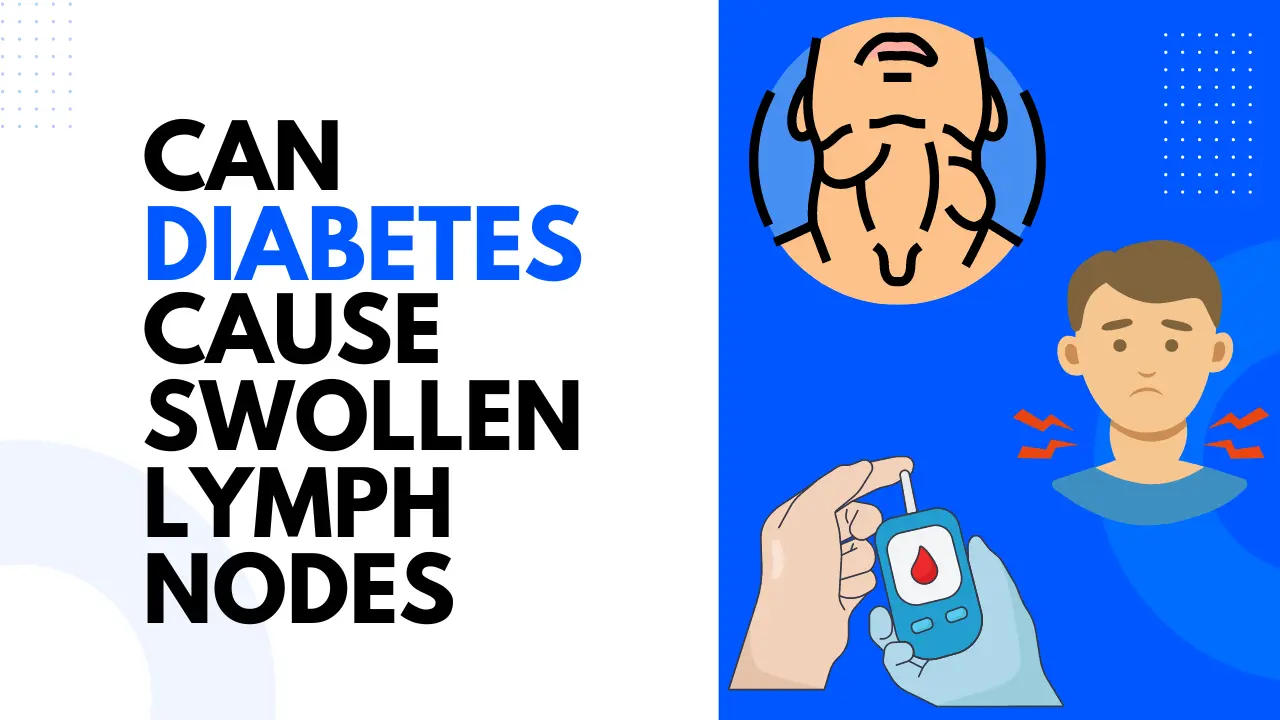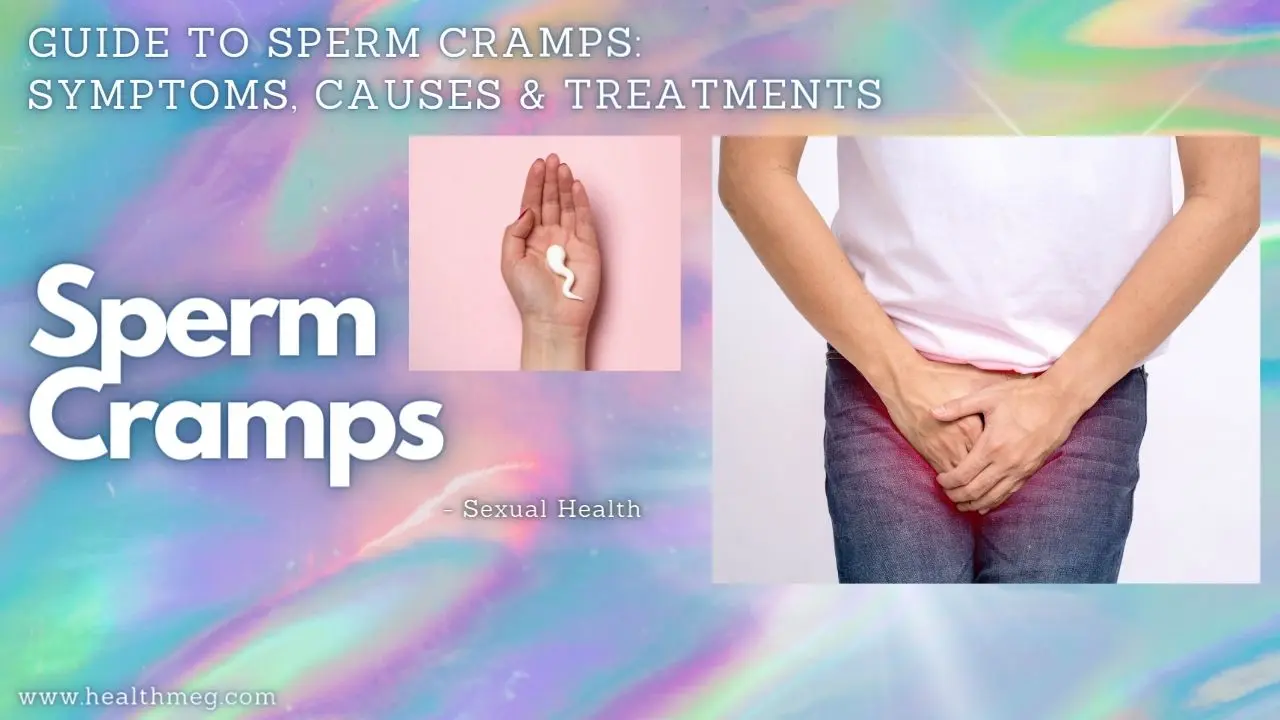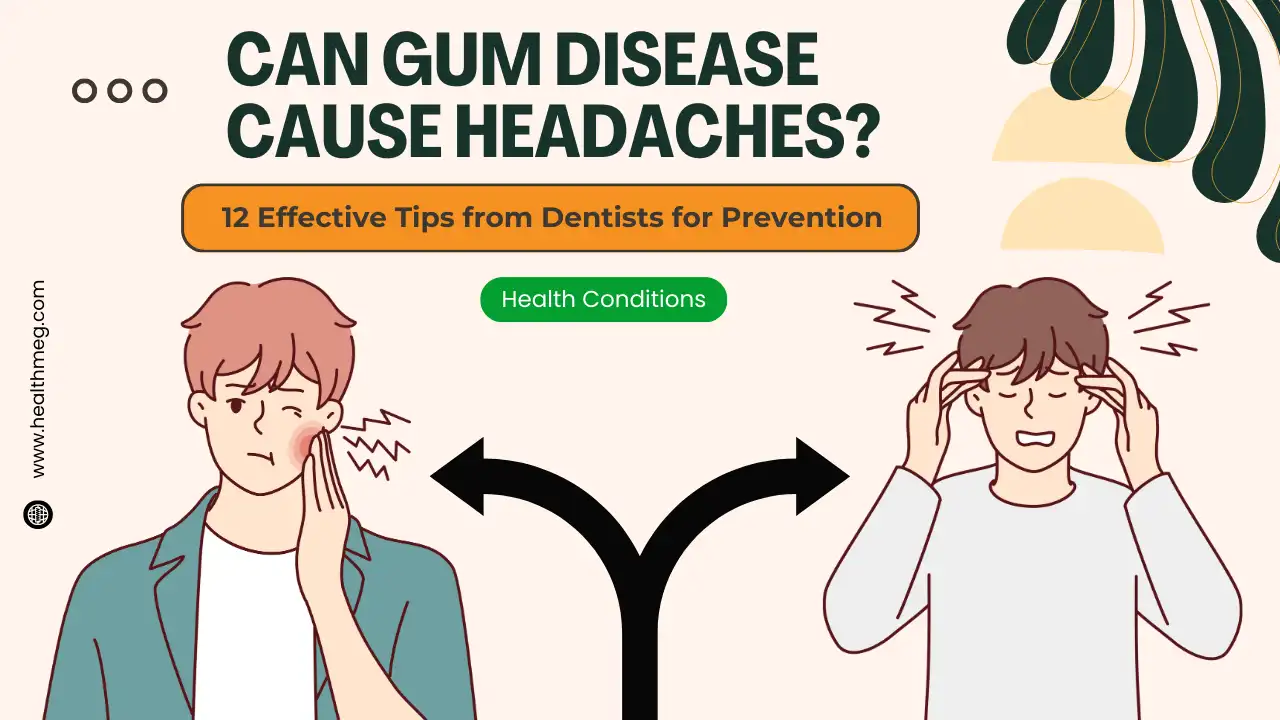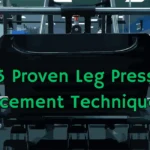Introduction
I’ll never forget the night I woke up with a throbbing toothache that felt like a tiny hammer was tap-dancing on my nerves. Desperate for relief, I dipped a cotton ball in clove oil, a remedy I’d heard about from a friend. The numbing sensation was a godsend, but it didn’t last long. Turns out, there’s no magic bullet for tooth pain—and that includes the misleading idea Kill Tooth Pain Nerve in 3 Seconds Permanently.
If you’re reading this, chances are you’re in a similar boat. Tooth pain is incredibly common, affecting nearly 20% of adults annually. The article will share ways to kill tooth nerve permanently at home, with natural way to kill tooth nerve such as using vanilla extract kill tooth nerve and more. But before you reach for drastic measures, let’s explore what’s really going on and how to find lasting relief.
Do Read the People Also Ask (FAQs) about this topic.
Key Takeaways
- it’s not possible to kill tooth pain nerve permanently in 3 seconds. Tooth pain, often caused by dental issues, requires professional diagnosis and treatment. Temporary relief can be achieved with home remedies and over-the-counter medications
- Trauma, gum disease, cavities etc. are some of the common factors that cause tooth pain.
- Through immediate alleviation techniques, home remedies, and expert dental care, the tooth pain nerve can be killed.
- Future tooth pain can be avoided by following preventive steps and being aware of when to see a dentist.
Understanding Nerve Tooth Pain
Tooth pain, also known as odontalgia, is a distressing sensation that occurs when a tooth or its surrounding tissues are damaged. This discomfort can range from mild to severe and can significantly disrupt daily life. Common causes of tooth pain include gum disease, tooth decay, and root canal infections.
- Gum disease: Gum disease is an inflammation of the gums that can lead to tooth loss if left untreated. It often results in tooth pain. Good oral hygiene practices can help prevent gum disease. There are many natural remedies by which you can cure gum disease without a dentist.
- Tooth decay: Tooth decay, a bacterial infection that destroys the tooth’s enamel and dentin, is another common cause of tooth pain. Regular dental checkups and cleanings can help prevent tooth decay.
- Root canal issues: Root canal issues can also lead to tooth pain. The root canal, which houses the tooth’s nerves and blood vessels, can become infected, causing severe pain. A root canal treatment may be necessary to treat the infection and alleviate the pain. However, there are many natural alternatives for treating root canal treatment. Still, if there is an emergency or your tooth pain nerve is not getting cured using these natural alternatives, it is important to consult a dentist.
While there are natural remedies like peppermint tea, garlic, clove oil, and saltwater rinses that can provide temporary relief, they should not replace professional dental care. If you’re experiencing frequent toothaches, it’s crucial to seek professional help.
In conclusion, good oral hygiene and professional dental care can help prevent and treat tooth pain caused by gum disease, tooth decay, and root canal problems.
Symptoms of Nerve Tooth Pain
Nerve tooth pain isn’t a single note, it’s a discordant orchestra of agony. It can be a throbbing drumbeat, a searing trumpet blast, or even a persistent, gnawing ache. The intensity and character can vary from person to person, but some common themes emerge:
- Sharp, stabbing pain: Like a tiny ice pick drilling into your tooth, this jolt of pain can make you jump.
- Sensitivity to hot or cold temperatures: Hot, cold, even the slightest breeze – your teeth suddenly become divas, throwing tantrums at any hint of temperature change.
- Swelling around the tooth: Your tooth may become the star of its own puffy-cheeked drama, a sign of inflammation and underlying trouble.
- Pain that comes and goes: Sometimes it’s a constant companion, other times it vanishes only to return with a vengeance, leaving you in a state of nervous anticipation.
The Experience of Nerve Tooth Pain
Imagine a sudden, sharp stab of pain shooting through your tooth, or a constant throbbing ache that pulsates with every heartbeat. This is the reality of nerve tooth pain. It’s an extremely unpleasant experience that can be as unpredictable as it is intense.
The pain may be a constant companion, or it might come and go, appearing at the most inconvenient times. It could be triggered by everyday activities, such as savouring a hot cup of coffee, enjoying a cold ice cream, or even just biting into an apple. The descriptions of the pain vary from person to person – some liken it to a relentless throbbing ache, while others say it feels like a sharp stab that takes their breath away.
Impact on Daily Life
Nerve tooth pain doesn’t just cause physical discomfort – it can disrupt your entire life. The intensity of the pain can make everyday tasks like eating, sleeping, or even talking a challenge. It can be so overwhelming that it becomes the only thing you can focus on, pushing everything else to the background. The pain can disrupt your daily activities, making it hard to concentrate on work, enjoy time with family, or even get a good night’s sleep. It’s not just a toothache – it’s a significant obstacle that can hinder your quality of life.”
Is it Possible to Kill Tooth Pain Nerve Permanently in 3 Seconds?
The short answer is no. Tooth pain, often caused by dental issues such as tooth decay, infections, gum disease, or dental trauma, involves complex tissue and nerve structures in the gums and teeth. Instantly and permanently eliminating this pain in just 3 seconds isn’t feasible.
To accurately diagnose and treat tooth discomfort, consultation with a dental expert is typically necessary. However, there are natural home remedies that can provide immediate relief. Remedies such as Saltwater Rinse, Clove Oil, Garlic, Peppermint, Ice Pack, Turmeric Paste, Hydrogen Peroxide Rinse, Ginger Root, Vanilla Extract, and Cucumber can offer relief in about 30 to 60 seconds. Some remedies may take 15 to 30 minutes, depending on the type of tooth pain experienced.
It’s crucial to remember that without understanding the underlying issue, attempts to kill tooth pain nerve in 3 seconds permanently could lead to severe consequences and tooth damage.
If you’re experiencing tooth pain, it’s essential to consult a dentist. They can perform a comprehensive examination, diagnose the problem, and recommend the best course of action. Depending on the severity of the issue, the dentist will identify the source of the pain and suggest appropriate treatments, which may include dental procedures like fillings, root canals, or extractions.”
Types of Nerve Tooth Pain

Depending on the underlying reason, tooth pain can present itself in a variety of ways and intensities. Following are some typical causes of dental pain:
- Sharp, Sudden Pain
- Throbbing Pain
- Sensitivity to Temperature
- Achy or Dull Pain
- Pain when Chewing
- Radiating Pain
- Intermittent Pain
- Pressure Pain
- Gum pain
- Jaw Pain
- Sinus-Related Pain
Brief details for each cause of dental pain are as follows:-
- Sharp, Sudden Pain: When biting down on something hard or eating hot or cold food, this kind of pain is frequently felt. It can be a sign of dental deterioration (dental decay), a loose filling, or a broken tooth.
- Throbbing Pain: A serious infection or an abscessed tooth can also cause throbbing tooth pain, which is typically persistent. The pain usually comes in the form of Intensity waves which frequently come and go.
- Sensitivity to Temperature: When exposed to hot, cold, sweet, or acidic stimuli, teeth become sensitive. It can be caused due to exposed dentin, receding gums, or enamel erosion.
- Achy or Dull Pain: Pain that is dull or aching may be a sign of bruxism (tooth grinding), gum disease, or a low-level infection. It can be uncomfortable, but it’s usually not too serious.
- Pain when Chewing: Pain or discomfort experienced during chewing or biting is frequently an indication of a dental issue, such as a broken tooth, decay, or a loose filling.
- Radiating Pain: Tooth discomfort can spread to other regions including the jaw, ear, or head. This can happen when there are specific dental issues, including impacted wisdom teeth.
- Intermittent Pain: Certain triggers, such as pressure, temperature fluctuations, or sweet foods, might result in intermittent or sporadic dental pain. It might be caused by a developing dental problem. It could be caused by a tooth problem that is developing.
- Pressure Pain: Pain that worsens when pressure is applied to the tooth, such as when you tap it with an item or an object, may be a sign that the tooth’s nerve or pulp is in trouble.
- Gum pain: In some cases, pain near the gums may be misinterpreted as tooth pain. Gum disease, infection, or inflammation are all possible causes of gum pain.
- Jaw Pain: Aches and pains in the jaw region, especially those in the temporomandibular joint (TMJ), may occasionally be caused by dental problems which can be misinterpreted as tooth pain.
- Sinus-Related Pain: Pain and pressure in the upper teeth caused by sinus infections or sinusitis might be misinterpreted as tooth pain.
You should be aware that depending on the underlying reason and individual factors, tooth pain can vary in form and degree. To find the root of the problem and choose the right course of action, a dentist’s accurate diagnosis is essential. It is advised to get dental care right away if you have severe or ongoing tooth pain to address the issue and reduce discomfort. To precisely identify the source of tooth discomfort, dental practitioners can utilize a variety of diagnostic techniques, including X-rays and examinations.
Causes of Nerve Tooth Pain
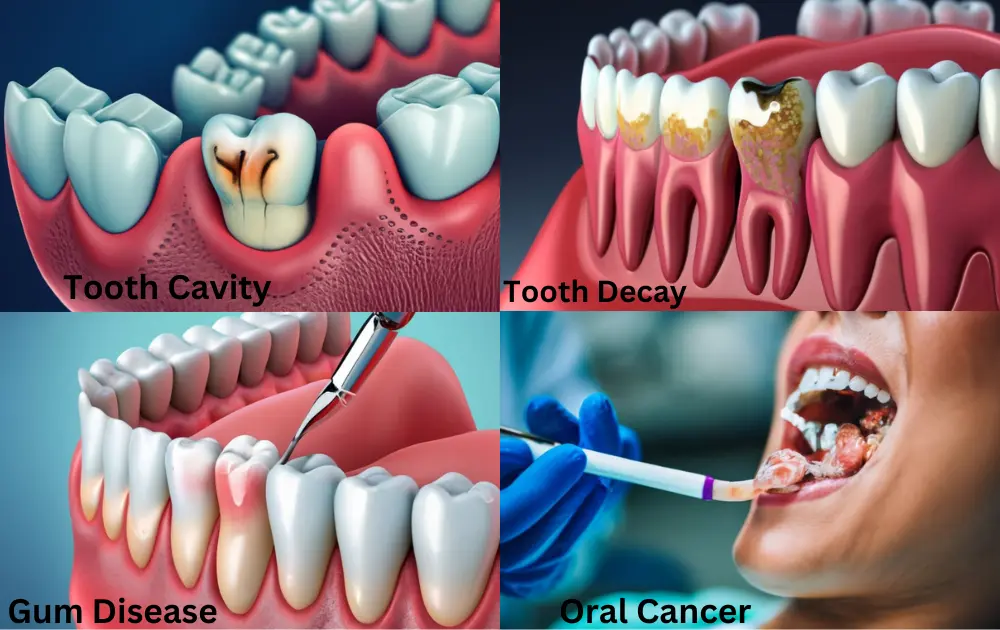
Many dental and oral health conditions can lead to tooth pain. Effective therapy depends on determining the root of your tooth pain. Here are a few typical reasons why teeth hurt or what causes tooth pain:
- Tooth Decay (Cavities)
- Gum (Periodontal) Disease
- Dental Abscess
- Tooth Fractures or Cracks (Broken or Cracked Teeth)
- Tooth Sensitivity
- Dental Fillings or Restorations
- Dental Pulp Infection
- Impacted Wisdom Teeth
- Orthodontic Appliances
- Teeth Grinding (Bruxism)
- Sinus Issues
- Teeth Whitening
- Injury or Trauma
- New tooth emergence (Eruption of New Teeth)
- Oral Cancer
Details of each cause of tooth pain is provided below:-
- Tooth Decay (Cavities): Cavities and tooth decay are two of the most frequent reasons for dental pain (Tooth Pain). Acids created by bacteria that destroy the tooth’s enamel (outside layer) can cause sensitivity and pain, especially when eating hot, cold, sweet, or acidic foods.
- Gum (Periodontal) Disease: Gum inflammation and recession can be caused by periodontal (gum) diseases like gingivitis or periodontitis. This could make the tooth’s delicate root surfaces visible, which would be painful, sensitive, and uncomfortable.
- Dental Abscess: A dental abscess is an uncomfortable infection that can develop at the tooth root or in the space between the gum and the tooth. If neglected, it frequently produces excruciatingly painful throbbing pain, and swelling, and can result in more significant health problems.
- Tooth Fractures or Cracks (Broken or Cracked Teeth): A broken or cracked tooth can hurt suddenly and intensely, especially when biting or chewing. The extent of the fracture determines how painful it is.
- Tooth Sensitivity: The dentin, the layer under the enamel, can become sensitive if it is exposed. This can happen as a result of tooth grinding (bruxism), enamel degradation, or gum recession. With sensitivity, eating hot, cold, sweet, or acidic foods might be uncomfortable.
- Dental Fillings or Restorations: On occasion, dental fillings or restorations may deteriorate over time by becoming brittle, broken, or damaged. As a result, the person suffering from the filling might need to be fixed or changed, which could be painful or uncomfortable.
- Dental Pulp Infection: Deep cavities or trauma that infects or inflames the dental pulp, the tooth’s deepest layer, can cause excruciating tooth pain. In order to solve this problem, root canal therapy is frequently required.
- Impacted Wisdom Teeth: Impacted wisdom teeth can cause discomfort, pressure, and even infection since they do not fully erupt through the gums. In such circumstances, surgical removal is frequently advised.
- Orthodontic Appliances: As the teeth shift, people using braces or other orthodontic appliances may experience temporary discomfort. Typically, this soreness or pain may be tolerated and is expected throughout orthodontic treatment.
- Teeth Grinding (Bruxism): Grinding or clenching the teeth, frequently as you sleep, can cause migraines, dental discomfort, and jaw pain. Changing one’s lifestyle or using dental equipment may help manage bruxism.
- Sinus Issues: Especially in the upper teeth, sinus infections or sinusitis can occasionally lead to severe tooth pain. Other sinus-related symptoms frequently coexist with this pain.
- Teeth Whitening: Both over-the-counter and professional teeth whitening procedures may cause temporary tooth sensitivity or discomfort.
- Injury or Trauma: A hit to the face or other physical injury to the mouth can harm the teeth or the tissues around them, causing tooth discomfort.
- New tooth emergence (Eruption of New Teeth): In children and newborns, the emergence of new teeth can result in slight discomfort and irritated gums.
- Oral Cancer: Although less frequent, lesions or malignancies (cancer) of the mouth (oral cancer) can cause ongoing oral pain or discomfort. For rapid treatment, early detection is crucial.
The presence of tooth discomfort should not be ignored as it is frequently a sign of a dental issue that needs to be examined and treated by a specialist. Ignoring tooth pain can result in more serious problems, so it’s best to see a dentist right away to find out what’s wrong and get the right care. The cause of tooth pain can be correctly determined by a dental professional, who can also advise on the best courses of action for recuperation and pain alleviation.
2 Ways To Kill Tooth Pain Nerve in 3 Seconds Permanently
Dealing with tooth pain can be a daunting experience. However, there are various methods available that can help alleviate this discomfort. These methods range from natural home remedies to over-the-counter medications, each offering a unique approach to pain relief. In this section, we will explore these different methods, providing you with a comprehensive guide to managing tooth pain. Remember, while these methods can provide temporary relief, it’s crucial to consult a dental professional for persistent tooth pain
Natural Remedies

Temporarily relieving tooth pain with natural remedies is possible, but a dentist’s diagnosis and treatment of the underlying dental problem are necessary. This section will guide you on how to permanently kill a tooth nerve at home using natural remedies.
Following are some all-natural treatments (Natural Home Remedies) for tooth pain:
- Saltwater Rinse
- Clove Oil
- Garlic
- Peppermint
- Ice Pack
- Turmeric Paste
- Hydrogen Peroxide Rinse
- Ginger Root
- Vanilla Extract
- Cucumber
Brief Details for each of these natural remedies are as follows:-
- Saltwater Rinse:
- Mix eight ounces of warm water with half a teaspoon of salt and dissolve it.
- Spend 30 seconds gargling with the saltwater mixture while concentrating on the afflicted area.
- Then spit it out. You should repeat this numerous times throughout the entire day. Saltwater can assist in destroying bacteria (microorganisms) and reduce inflammation.
This could lead to killing a tooth nerve.
- Clove Oil:
- Put some clove oil on a cotton ball.
- For many minutes, gently press the cotton ball against the plagued area.
- Eugenol, a natural anaesthetic with antibacterial properties found in clove oil, can temporarily reduce pain.
- Garlic:
- Make a paste by crushing a clove of garlic.
- Apply the paste to the tooth that is damaged.
- Natural antibacterial and painkilling qualities exist in garlic.
- Peppermint Tea Bags:
- After using a peppermint tea bag, allow it to cool.
- For a few minutes, apply the tea bag that has cooled to the sore tooth (tooth that is paining).
- The numbing and anti-inflammatory properties of peppermint can provide comfort.
- Ice Pack:
- In a thin cloth, wrap an ice pack or a bag of frozen vegetables.
- For 15 minutes, apply it to the outside of your cheek.
- Cold can numb the area and assist in reducing inflammation, providing relief.
- Turmeric Paste:
- To form a thick paste, combine turmeric powder with a small amount of water.
- Apply the paste to the area that is damaged, then leave it for some time.
- Anti-inflammatory and antibacterial properties are present in turmeric.
- Hydrogen Peroxide Rinse:
- Combine water and 3% hydrogen peroxide in an equal amount.
- For 30 seconds, swish the mixture around in your mouth before spitting it out.
- After that, rinse your mouth with normal water.
- By doing so, you can exterminate microorganisms (kill bacteria) and relieve inflammation.
- Ginger Root:
- Slice up some fresh ginger root.
- On the side of the sore tooth (the tooth side that is hurting), chew it slowly.
- Ginger contains anti-inflammatory properties that can help reduce tooth pain.
- Vanilla Extract:
- A cotton ball should be dipped in a small amount of vanilla extract.
- For a short amount of time, place it on the sore tooth (the affected tooth).
- Vanilla extract can provide a relaxing or cooling effect to your affected teeth.
- Cucumber:
- Slice a fresh cucumber, then apply a cool slice to the sore spot (the area that is affecting pain).
- Cooling and soothing properties are present in cucumber that can ease discomfort (helps you reduce tooth pain)
Keep in consideration that these treatments are not a replacement for expert dental care. A cavity, infection, or gum disease are examples of more serious dental problems that might manifest as tooth discomfort and need to be treated by a dentist. Consult a dentist right away if your tooth pain doesn’t go away or gets worse as it could be a sign of a more serious issue, such as the need to kill nerve in tooth.
Use of Medication

When tooth pain strikes, over-the-counter pain medications can provide temporary relief from tooth nerve pain when used properly. Here’s a look at some common options:
- NSAIDs
- Acetaminophen
- Aspirin
- Lidocaine
- Oral Anesthetic Rinses
Brief Details for each of these Use of Medication are as follows:-
- NSAIDs (Non-steroidal anti-inflammatory drugs): Medications like Ibuprofen (Advil, Motrin) or Naproxen (Aleve) work by reducing inflammation that can put pressure on tooth nerves. It’s important to follow dosage instructions carefully to avoid stomach irritation.
- Acetaminophen: Drugs like Paracetamol/Acetaminophen (Tylenol) can effectively block nerve pain signals, providing relief. However, they do not reduce inflammation. Always adhere to the directed dosage and avoid exceeding the daily maximum.
- Aspirin: As a mild analgesic and anti-inflammatory, Aspirin can temporarily alleviate low to moderate tooth pain. It should not be used by individuals with bleeding disorders.
- Lidocaine: Available over-the-counter in gel form, Lidocaine can numb the gums and tooth surface when applied topically, providing temporary relief. However, it does not address the source of the pain.
- Oral Anesthetic Rinses: Medicated numbing rinses with Benzocaine can be swished around the mouth to numb tooth pain. These should only be used as a short-term remedy until you can see a dentist.
While these oral pain medications can provide temporary relief, they do not address the underlying problem causing the tooth pain. It’s crucial to consult a dentist for a diagnosis and treatment plan for lasting relief. Relying solely on medications without professional dental care is not recommended. Always inform your dentist about any medications you are taking to avoid potential complications.
Pros and Cons: Natural Remedies vs. Medications
| Pros Vs Cons | Natural Remedies | Medications |
|---|---|---|
| Pros | – Widely available ingredients – Avoid side effects of medications – Provide temporary numbness and pain relief – Anti-inflammatory properties reduce swelling – Can enhance healing when used alongside dental treatment – Generally more affordable options | – Effectively block pain signals to the brain – Can provide rapid and powerful pain relief – Convenient to take as oral medications – Dosages can be adjusted as needed – Combining drugs with different mechanisms can enhance pain relief |
| Cons | – Do not treat the underlying cause of pain – Results are often mild and temporary – Finding the most effective remedy may require trial and error – Some people may be allergic to certain ingredients – Relying solely on natural remedies can worsen the condition | – Do not address the source of pain – Potential for adverse side effects and reactions – Risk of dependency with stronger opioids – Incorrect use can damage the stomach, liver, kidneys – Using medication without professional treatment can worsen the infection – Finding the most suitable medication may require trial and error |
Immediate Relief Methods For Nerve Tooth Pain
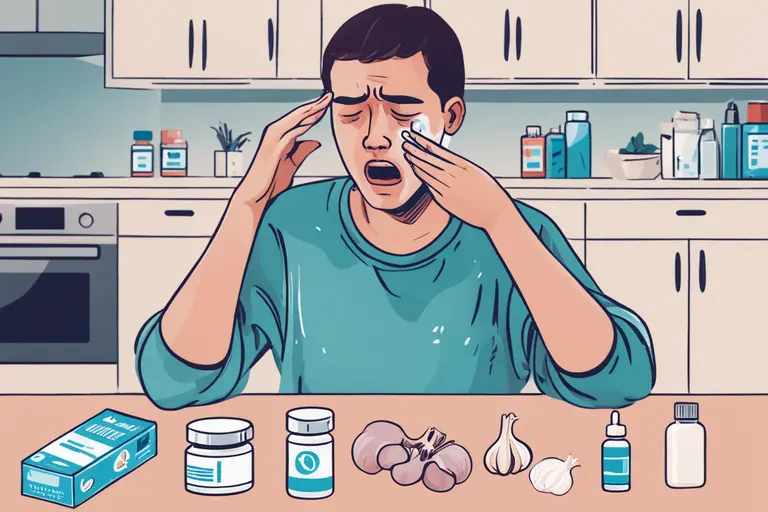
Finding immediate (quick) relief when you are dealing with tooth pain is really important. Here are a few ways to temporarily relieve tooth pain.
- Use of Cold Compress
- Pain Relievers (over-the-counter painkillers)
- Trying out Natural Remedies (Home Remedies)
Use of Cold Compress
Within 15 minutes, a cold compress can relieve tooth pain. The area may feel numb and the cool temperature may assist in reducing inflammation, offering momentary comfort. Apply a cold compress to the injured region by wrapping a bag of ice or a cold pack in a towel. With 15-minute pauses in between, press the compress against the affected area for 15 minutes at a time.
Pain Relievers (over-the-counter painkillers)
Ibuprofen and paracetamol are two over-the-counter medications or pain relievers (painkillers) that might temporarily ease tooth pain. These drugs reduce inflammation and stop the brain from receiving pain signals. It’s important to adhere to the suggested dosage and not go over the daily limit. It is advised to seek professional dental care if the pain persists or worsens.
It’s important to remember that while these procedures temporarily relieve tooth pain, they don’t deal with the underlying problem. It is advised to get professional dental care to treat the pain’s underlying source and avoid subsequent issues.
can we use painkillers as natural remedies for killing tooth pain?
Painkillers, especially over-the-counter medicines like acetaminophen (Tylenol) or ibuprofen (Advil), are not natural treatments for tooth pain. They are pharmaceuticals that consist of anti-inflammatory and pain-relieving properties. Although using these painkillers can relieve you from tooth pain, they are not included in natural remedies.
Natural tooth pain relief often involves the use of ingredients or procedures that are obtained from nature, such as herbal therapies or DIY solutions like warm seawater rinses, clove oil applications, or cold compresses. These herbal treatments may provide tooth pain relief, and they can be combined with medications (painkillers) to provide more effective and long-lasting relief.
The underlying reason for the toothache may not be resolved by natural remedies, so it’s important to keep in mind that expert dental care is necessary to identify and resolve the base of the problem. Dental issues shouldn’t be disregarded because, if untreated, they might result in more serious concerns.
Preventive Measures

It is usually preferable to prevent tooth pain rather than try to treat it. To reduce the possibility of tooth pain, the following precautions can be taken:
- Good Oral Hygiene
- Regular Dental Checkups
- Avoid Sugary and Acidic Foods
- Wear a Mouthguard
- Numb the Area
- Home Remedies (Natural Remedies)
Good Oral Hygiene
To avoid tooth decay and gum disease, it is crucial to practise proper oral hygiene. Plaque and bacteria that might result in tooth pain or even killing tooth nerve can be removed with the help of mouthwash, daily flossing, and twice-day brushing.
Regular Dental Checkups
The detection and prevention of gum disease and tooth decay are both made possible by regular visits to the dentist. Additionally, before a problem arises, your dentist can spot any potential problems that could cause tooth pain and offer treatment.
Avoid Sugary and Acidic Foods
Eating sugary and acidic meals can make you more likely to develop gum disease and tooth damage which can potentially kill exposed tooth nerve. Avoiding certain meals and beverages can reduce the likelihood of developing tooth pain.
Wear a Mouthguard
Injuries to the teeth that can cause tooth pain can be avoided by using a mouthguard when engaging in physical activities like sports.
Numb the Area
An area that has been numbed might temporarily ease tooth pain. Pain and swelling can be reduced by applying a cold compress or utilizing over-the-counter numbing gels.
Home Remedies (Natural Remedies)
Some natural therapies can also aid in relieving tooth pain. Pain and inflammation can be reduced by gargling with salt water, applying clove oil to the affected area, and applying garlic paste.
Overall, maintaining good oral hygiene, avoiding foods high in sugar and acid, using a mouthguard, and visiting the dentist regularly can all help to prevent tooth pain. Using home treatments and numbing the area can offer temporary relief from tooth pain.
When to Consult a Dentist

While home remedies and over-the-counter medications can provide temporary relief from tooth pain, they are not a substitute for professional dental care. If you’re experiencing persistent tooth pain, it’s crucial to consult a dentist. A dental professional can perform a comprehensive examination, diagnose the underlying cause of the pain, and recommend an appropriate treatment plan.
It’s particularly important to seek prompt dental care if you have a fever, swelling, or severe tooth pain, as these could be signs of a more serious condition. Remember, early intervention can prevent further damage and help preserve your oral health.
The presence of tooth pain may indicate a major issue. Even if there are numerous over-the-counter medicines and home therapies, certain medical conditions necessitate dental care. A dentist should be consulted in the following circumstances
- Gum Disease
- Root Canal
Gum Disease
A frequent issue that can hurt your teeth is gum disease. If gum disease is left untreated, it can cause infection in the gums and might result in tooth loss. Bad breath, swollen gums, and bleeding gums are all signs of gum disease. Consult a dentist as soon as you can if you think you might have gum disease. They can offer you therapy to stop further harm to your gums and teeth.
Root Canal
An infected or damaged tooth can be treated using a dental procedure known as a root canal. The dentist fills the tooth with a particular material after removing the tooth’s infected or broken pulp. Despite being a common dental function, root canals can be uncomfortable and you might even need specialized dental treatment. It may be necessary to get a root canal if you suffer from severe tooth pain. To decide on the best course of action, consult a dentist.
In general, it’s essential to see a dentist if you have severe or ongoing tooth pain. They are able to identify the underlying source of your discomfort and treat it to make you feel better. Waiting till your discomfort is intolerable is not advisable. Looking for expert dental care can stop further harm to your teeth and gums and help you maintain good oral health.
Conclusion
Dealing with tooth pain can be a daunting experience. While the idea of how to permanently kill a tooth nerve may seem appealing, it’s simply not feasible due to the complex anatomy of our teeth and gums. Professional diagnosis and treatment are essential to safely address the root cause of the pain.
There are various methods that can provide temporary relief as you seek dental care. Cold compresses, over-the-counter pain relievers, and natural remedies may offer a brief respite. However, for lasting relief, it’s crucial to consult a dentist. They can identify the source of discomfort through x-rays, exams, and testing, and recommend appropriate treatments to resolve issues like cavities, cracked teeth, abscesses, or gum disease.
With proper treatment, tooth pain does not have to be a permanent part of your life. Regular dental checkups, good oral hygiene practices, a healthy diet, and prompt treatment of injuries can help prevent many dental problems and reduce your risk of experiencing painful dental issues.
While the notion of rapidly alleviating tooth nerve pain may seem like a dream, in most cases, it’s very treatable with professional care. Don’t endure constant discomfort—seek help to keep your teeth and gums healthy, pain-free, and functioning properly for years to come. And remember, there’s no magic solution to kill tooth pain nerve in 3 seconds permanently at home, but with the right care and treatment, you can manage and even eliminate tooth pain.
References
https://www.who.int/news-room/fact-sheets/detail/oral-health
https://www.ada.org/resources/research/science-and-research-institute/oral-health-topics/oral-analgesics-for-acute-dental-pain
https://www.who.int/news/item/18-11-2022-who-highlights-oral-health-neglect-affecting-nearly-half-of-the-world-s-population
https://medlineplus.gov
People Also Ask (FAQs)
Q) how to deaden a tooth nerve
A) There are several ways to temporarily deaden a tooth nerve at home, including using clove oil, garlic, ice packs, salt water rinses, whiskey, and over-the-counter numbing gels or medicines. However, these methods only provide short-term relief. For permanent tooth nerve relief, you’ll need to see a dentist for procedures like root canals or extractions which remove the nerve entirely.
Q) how to kill a tooth nerve
A) Killing the tooth nerve requires professional dental work like a root canal or extraction. During these procedures, the dentist drills into the tooth pulp and nerve and then removes it completely. Once the nerve is taken out, you’ll no longer feel any pain or sensitivity from that tooth since the signals can’t fire.
Q) how to kill tooth nerve
A) Some at-home remedies like clove oil, vanilla extract, and whiskey can temporarily kill tooth nerve pain. But they don’t permanently kill the nerve. For that, you need a root canal or tooth extraction performed by a dentist to fully remove the tooth’s nerve. The procedures stop the nerve from sending pain signals by removing it entirely.
Q) what kills tooth nerve
A) Root canal treatments and tooth extractions are the only ways to permanently kill a tooth nerve. During these dental procedures, the dentist drills into the tooth pulp, extracts the nerve, and cleans out any infected tissue in the root canal network. This completely removes the nerve so it can no longer transmit pain signals.
Q) vanilla extract tooth pain treatment review
A) Applying vanilla extract to an aching tooth can provide temporary pain relief because it contains alcohol that numbs nerves. However, it doesn’t kill the tooth nerve. User reviews indicate it works for a short time but the severe pain eventually comes back. For permanent tooth nerve pain relief, dental procedures are needed to fully remove the nerve.
Q) How do you stop nerve pain in your tooth ASAP?
A) Getting emergency dental treatment is the fastest way to stop tooth nerve pain right away. The dentist will numb the area around the tooth and may start a root canal procedure to remove the inflamed nerve. At home, rinsing with very cold water or numbing gels/medicines might provide temporary relief.
Q) What kills the nerve in a tooth?
A) The only ways to permanently kill the nerve in a tooth are root canal treatment and tooth extraction performed by a dentist. These procedures remove the tooth’s pulp and nerve completely so it can no longer transmit pain signals. Damaging the nerve won’t kill it, so professional dental work is required.
Q) How do you get rid of a toothache in 5 minutes?
A) It’s very difficult to permanently get rid of a toothache in just 5 minutes at home. Numbing gels, painkillers like ibuprofen, or cold compresses may temporarily relieve pain in 5 minutes. But for permanent relief, you need to see a dentist for treatment of the tooth’s damaged nerve.
Q) Does salt water kill nerve pain?
A) Rinsing with warm salt water can help reduce tooth nerve pain temporarily by soothing inflammation. However, it doesn’t kill the nerve or address the underlying cause. For permanent pain relief, you need to see a dentist to remove the tooth’s nerve with a root canal or extraction.
Q) Can a painful tooth nerve heal itself?
A) Unfortunately, once a tooth nerve becomes damaged or inflamed, it usually won’t heal itself. The severe pain is a signal that the nerve needs professional dental treatment. Left untreated, the pain will likely get worse over time as the nerve becomes more irritated.
Q) Why is tooth nerve so painful?
A) Exposed tooth nerves cause severe pain because the nerves send signals to the brain that something is wrong. Damage, inflammation, or temperature changes irritate the nerve and trigger pain signals. As the nerve becomes more irritated over time, the signals intensify.
Q) How can I heal my tooth nerve naturally?
A) There is no way to truly heal a damaged tooth nerve at home. You need professional dental treatment like a root canal or extraction to remove the nerve and stop the pain signals. Some home remedies may temporarily relieve symptoms but won’t treat the underlying problem.
Q) What is the best painkiller for a toothache?
A) For severe tooth pain, dentists often recommend ibuprofen or prescription-strength painkillers containing hydrocodone or codeine. These medicines can temporarily numb pain while you wait for dental treatment. Just don’t overuse them as they come with risks.
Q) Can a tooth survive without a nerve?
A) Yes, a tooth can remain healthy and functional even after its nerve is removed with a root canal treatment. The tooth pulp and some nerves are removed, but the surrounding root, tissues, and bone stay intact so the tooth can still anchor into the jaw.


